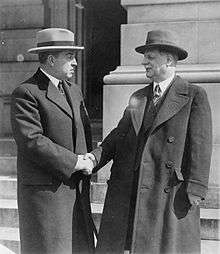John Boynton Philip Clayton Hill

John Boynton Philip Clayton Hill (May 2, 1879 – May 23, 1941) was a U.S. Congressman from the 3rd Congressional district of Maryland, serving three terms from 1921 to 1927.
Biography
Hill was born in Annapolis, Maryland, and attended the common schools. He graduated from Johns Hopkins University in 1900 and from the law department of Harvard University in 1903. He was admitted to the bar the same year and commenced practice in Boston, Massachusetts. He returned to Baltimore, Maryland, in 1904 and continued the practice of law.
Hill was an unsuccessful candidate for election to the Sixty-first Congress in 1908. He served as United States Attorney for the district of Maryland from 1910 to 1915. In 1915, Hill was an unsuccessful candidate for mayor of Baltimore, and served as delegate to the Republican National Convention in 1916. He served as judge advocate for the Fifteenth Division, and attached to the Fourteenth Cavalry, Mexican border service, from August 26 to December 15, 1916. During the First World War, he was major and lieutenant colonel in the United States Army in 1918 and 1919.
After the war, Hill was elected as a Republican to the Sixty-seventh, Sixty-eighth, and Sixty-ninth Congresses, serving from March 4, 1921 to March 3, 1927. To date, he is the last Republican to represent a significant portion of Baltimore in the House. He was an unsuccessful candidate for the United States Senate in 1926, an unsuccessful candidate for election in 1928 to the Seventy-first Congress, and again in 1936 to the Seventy-fifth Congress. Hill moved to New York City in 1937 and continued the practice of law until he returned to Annapolis in 1940. Hill died in Washington, D.C., and is interred in Arlington National Cemetery.
During Prohibition, Hill planted some grape vines and apples trees in his yard, and renamed his house "Franklin Farms", since farmers were allowed to make wine and cider. He was arrested and charged with the illegal manufacture of liquor, but the jury pronounced it "not intoxicating in fact", even though its alcohol content was more than 12%.[1]
References
- ↑ Cottom, Ric (2017). Your Maryland: Little-Known Histories from the Shores of the Chesapeake to the Foothills of the Allegheny Mountains. JHU Press. p. 146. Retrieved 23 September 2018.
| Wikimedia Commons has media related to John Boynton Philip Clayton Hill. |
- United States Congress. "John Boynton Philip Clayton Hill (id: H000597)". Biographical Directory of the United States Congress. Retrieved on 2009-02-22
| U.S. House of Representatives | ||
|---|---|---|
| Preceded by Charles P. Coady |
Maryland's 3rd congressional district 1921–1927 |
Succeeded by Vincent L. Palmisano |
| 67th | Senate: France • Weller | House: Linthicum • Mudd • Zihlman • Blakeney • Goldsborough • Hill |
| 68th | Senate: Weller • Bruce | House: Linthicum • Mudd • Zihlman • Goldsborough • Hill • Tydings |
| 69th | Senate: Weller • Bruce | House: Linthicum • Zihlman • Goldsborough • Hill • Tydings • Gambrill |